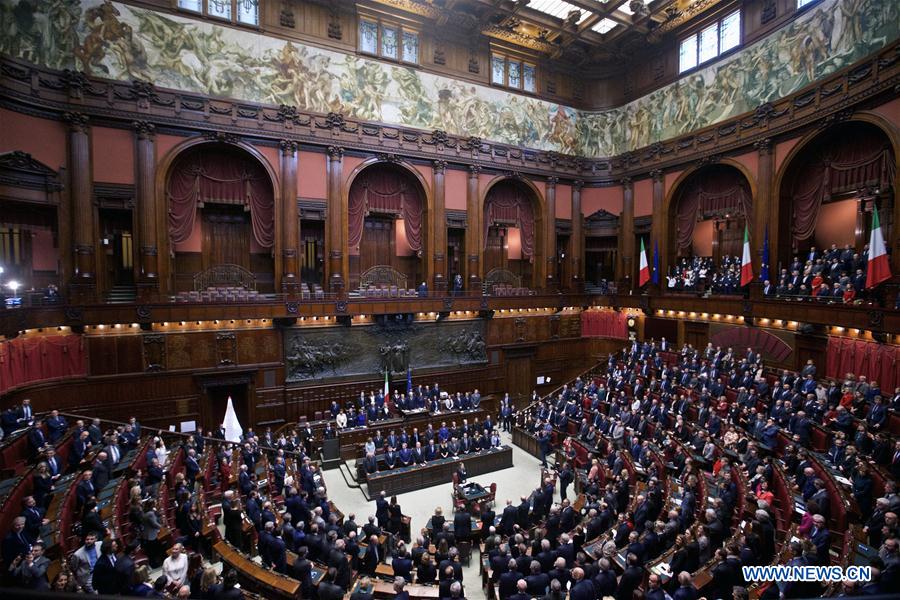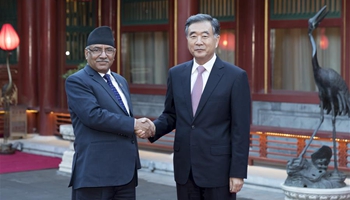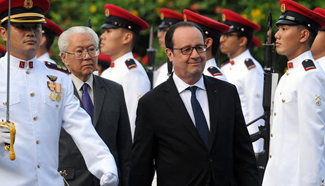
Photo taken on March 22, 2017 shows the the ceremony to celebrate the forthcoming 60th anniversary of the Treaty of Rome in the Italian Chamber of Deputies in Rome, Italy. Italian lawmakers gathered in the Chamber of Deputies on Wednesday to celebrate the forthcoming 60th anniversary of the Treaty of Rome, which triggered the whole integration process in 1957. (Xinhua/Jin Yu)
By Eric J. Lyman
ROME, March 26 (Xinhua) -- Italy's Five-Star Movement, the political organization created eight years ago by comedian-turned-activist Beppe Grillo, may be poised for its best-ever election result the next time when Italians go to the polls nationally.
It is, however, still anyone's guess what will happen if the party finishes ahead of all its rivals for the first time.
There is still no firm date on when the elections will take place. As of now, the vote is scheduled for the first half of 2018. But some political figures are pushing for it to take place earlier, after the country's 2018 budget is finalized later this year.
But with the Democratic Party, the dominant party of the last generation, in disarray after some members of its old guard spit away to form a rival party, and a wave of support for anti-establishment parties across Europe, circumstances may be lining up in favor of the Five-Star Movement -- regardless of when the vote takes place.
"The problems within the Democratic Party are certainly an advantage for the Five-Star Movement," Roberto Biorcio, a sociologist and political scientist with Milano-Bicocca University, said in an interview. "The question is: What will happen to the Five-Star Movement if it wins."
The Five-Star Movement is coming off its best election results yet, when a nationwide series of mayoral elections last year resulted in the party winning in Rome and Turin, Italy's first and fourth largest cities, respectively.
The two mayors -- Virginia Raggi in Rome and Chiara Appendino in Turin -- are the two highest ranking elected figures in the party's history.
The next vote in Italy will also come amid a rising tide of anti-establishment sentiment in Europe.
Still, despite all that, few are predicting the party will reach the 40-percent threshold needed to form a government on its own. And the Five-Star Movement's own bylaws include language prohibiting it from entering into binding alliances, making it difficult for the party to emerge as the head of a coalition.
"Don't forget that if the Five-Star Movement was willing to govern as part of a coalition, that could have happened in 2013 when the Democratic Party fell short of a majority and [then Democratic Party leader Pier Luigi] Bersani reached out and Grillo was not interested," Biorcio said.
There are also growing divisions within the Five-Star Movement, between what Biorcio calls the traditional radical faction that founded the party and a more pragmatic wing open to compromise. It is unclear how long the two blocs will be able to work together.
It might not matter. According to Mattia Diletti, a political science researcher at Rome's La Sapienza University, the Five-Star Movement is more comfortable in opposition.
"If the Five-Star Movement emerges from the next election as the largest party in parliament and they remain as an opposition party, then they would be in an even stronger position to disrupt than they are today," Diletti told Xinhua.
That would be a recipe for an even weaker political situation than the one that exists today. For that reason, Biorcio, Diletti, and other commentators say, new elections are unlikely until after the 2018 budget is passed.
The current government, led by the Democratic Party's Paolo Gentiloni, has been low-key enough to avoid strong opposition from any of the opposing factions, and it is likely the Gentiloni government could put together a national budget that parliament will approve.
After that? It's still anyone's guess.
Political scientists and economists agree Italy is in need of major reforms to foster political stability and spark economic growth.
That is unlikely to come from a future minority government with a powerful Five-Star Movement in opposition.











